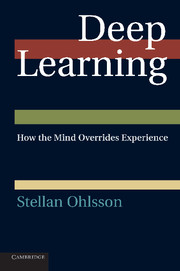Preface
Published online by Cambridge University Press: 25 January 2011
Summary
The theme of this book is that human beings possess cognitive processes that enable them to override the imperatives of past experience and to act and think in novel ways, and that these processes differ from the types of cognitive processes usually envisioned in psychological theories of learning. The capability for what I call deep learning – or, more precisely, non-monotonic cognitive change – constitutes a distinct aspect of mind that follows its own laws and hence requires its own theory. The book develops this theme by summarizing and extending prior research by me and others with respect to three specific types of non-monotonic change: the creation of novelty; the adaptation of cognitive skills to changing circumstance; and the conversion from one belief to another, incompatible belief. The book offers novel theories of the mental processes operating in each of these three types of cognitive change, as well as a unified theory that captures the abstract principles that they share.
My interest in creativity, adaptation and conversion preceded my awareness that these topics are variations on a theme. As a graduate student at the University of Stockholm in the late 1970s, I tried to relate the Gestalt view of insight to the information-processing theory of problem solving proposed by A. Newell and H. A. Simon. My first attempt at such a synthesis was published in 1984, and over the years it morphed into the theory of insight in Chapter 4. I thank my Ph.D. advisor, Yvonne Waern, for her constant encouragement and strong support for this as well as other oddball activities, and for managing a weekly cognitive seminar where her students could argue about cognition.
- Type
- Chapter
- Information
- Deep LearningHow the Mind Overrides Experience, pp. vii - xviPublisher: Cambridge University PressPrint publication year: 2011



